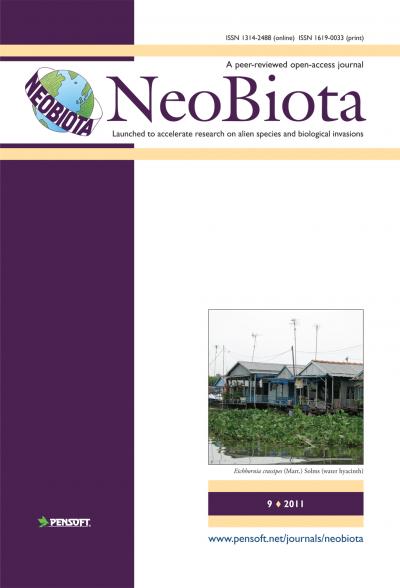亲缘关系密切的入侵物种可能受到相同人口生活阶段的控制
IF 3
2区 环境科学与生态学
Q1 BIODIVERSITY CONSERVATION
引用次数: 0
摘要
相互关系密切的入侵物种可能具有相似的种群动态,因此,可以通过针对相似的生命阶段来控制。我们研究了美国纽约的两种入侵knapheed物种,斑点knapheet(Centaurea stoebe subsp.micranthos)和杂交草地knaphee复合体(Centaorea×moncktonii),以确定它们在三年内在几个地点的个体种群增长率(λ)。两种knapheed的生长速率都大于1(斑点knapheeλ在1.005–1.440之间;草地knapheetλ在1.541–2.408之间),但年份和地点之间存在高度变异。一项草地knapheed的研究种群主要由黑knapweed祖先(C.nigra)的个体组成,该物种在引入时没有入侵性。对于该群体,预测的动力学是稳定的(λ近似为1)。弹性分析表明,七个地点中有六个地点的开花-开花期对种群增长率的贡献最大,斑点和草地种子七个地点的四个地点也有三个额外的过渡影响:幼苗-营养期、营养-开花期和开花-幼苗期。我们模拟了生命率的增加将如何影响种群增长,发现斑点和草地knapheed都遵循相同的模式。成熟成花植株的成活率对种群生长的影响最大,其次是新苗和成苗的成活率。在所有情况下,反应都是非线性的,较小的初始变化具有较大的影响。后期生命率的增加也往往对增长率产生积极影响,但影响更为温和。尽管敏感性分析表明,早期生命率对人口增长的影响最大,但针对这些阶段进行管理并不可行。相反,减少老年生存期或推迟植物人成熟会更有效。种群动态和每个生命阶段对种群增长的贡献之间的相似性支持了为一个物种制定的方案对另一个物种应该有效,但需要注意的是,任何生物控制剂在使用前都应该直接在目标物种上进行测试。本文章由计算机程序翻译,如有差异,请以英文原文为准。
Closely related invasive species may be controlled by the same demographic life stages
Invasive species that are closely related to each other may have similar population dynamics and, therefore, be controlled by targeting similar life stages. We studied two invasive knapweed species, spotted knapweed (Centaurea stoebe subsp. micranthos) and the hybrid meadow knapweed complex (Centaurea × moncktonii) in New York, USA, to determine their individual population growth rates (λ) across several sites over three years. Both knapweed species had growth rates that were greater than 1 (spotted knapweed λ ranged from 1.005–1.440; meadow knapweed λ ranged from 1.541–2.408), but there was high variability between years and sites. One study population of meadow knapweed was composed primarily of individuals of black knapweed ancestry (C. nigra), a species that, while introduced, is not invasive. For this population, the projected dynamics were stable (λ approximately 1). Elasticity analysis showed that the flowering-to-flowering stage contributed the most to population growth rate for six of seven sites and three additional transitions were also influential for four of seven sites of spotted and meadow knapweed: the seedling-to-vegetative stage, vegetative-to-flowering stage and flowering-to-seedling stage. We simulated how increasing vital rates would affect population growth and found that both spotted and meadow knapweed followed the same pattern. The vital rate of established seedlings maturing to flowering plants had the greatest effect on population growth, followed by the survival of new and established seedlings. In all cases, the responses were non-linear, with small initial changes having a large effect. Increases in the vital rates of later stages also tended to have a positive effect on growth rate, but the effects were more modest. Although the sensitivity analysis indicated that early vital rates had the largest effect on population growth, targeting these stages is not practical for management. Rather, reducing older life stage survival or delaying maturation of vegetative individuals would be more effective. The similarity between the population dynamics and how each life stage contributes to population growth provides support that protocols developed for one species should be effective for the other species with the caveat that any biological control agent should be directly tested on the target species before being utilised.
求助全文
通过发布文献求助,成功后即可免费获取论文全文。
去求助
来源期刊

Neobiota
Agricultural and Biological Sciences-Ecology, Evolution, Behavior and Systematics
CiteScore
8.10
自引率
7.80%
发文量
0
审稿时长
6 weeks
期刊介绍:
NeoBiota is a peer-reviewed, open-access, rapid online journal launched to accelerate research on alien species and biological invasions: aquatic and terrestrial, animals, plants, fungi and micro-organisms.
The journal NeoBiota is a continuation of the former NEOBIOTA publication series; for volumes 1-8 see http://www.oekosys.tu-berlin.de/menue/neobiota
All articles are published immediately upon editorial approval. All published papers can be freely copied, downloaded, printed and distributed at no charge for the reader. Authors are thus encouraged to post the pdf files of published papers on their homepages or elsewhere to expedite distribution. There is no charge for color.
 求助内容:
求助内容: 应助结果提醒方式:
应助结果提醒方式:


